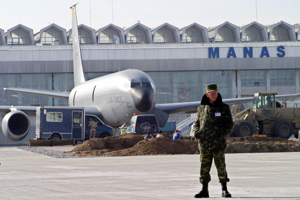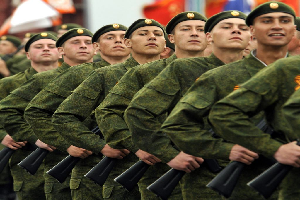Kyrgyzstan's Decision To Renounce Manas Transit Center Favors Russia
by Erica Marat (06/26/2013 issue of the CACI Analyst)
The Kyrgyz parliament has voted to support President Almazbek Atambaev’s decision to renounce the contract for the U.S. transit center at Manas airport. The main reasons for the parliament’s vote were primarily a response to the Kremlin’s decision to write off a large chunk of Kyrgyzstan’s debt and to Moscow’s promise to construct hydropower plants in Kyrgyzstan, as well as to Washington’s abrupt decision to dismiss criminal charges against Maksim Bakiev, son of former president Kurmanbek Bakiev. In the meantime, uncertainty lingers regarding the finality of the parliament’s decision and how the president will proceed with his plan to build an international transit hub at Manas once the U.S. leaves.

CACI Analyst, May 29, 2013
Russia Accuses Azerbaijan Of Fraudulent Eurovision Vote
by Mina Muradova (05/29/2013 issue of the CACI Analyst)
A diplomatic row has emerged between Russia and Azerbaijan over "stolen" points that Azerbaijan allegedly gave to its northern neighbor during the Eurovision song contest held in Malmo, Sweden, on May 18. This year, the talk of politicization of the annual competition of European pop music reached its peak. Turkey refused to participate in the contest by claiming that the latest rules in the voting system, the 50%-50% combination of jury voting and phone voting, are unfair and that the involvement of a jury would negatively affect Turkey’s points.
A New Turn In Russia's Military Policy In Central Asia?
by Stephen Blank (05/29/2013 issue of the CACI Analyst)
Russia is changing its defense policies in Central Asia and the Caucasus. Late last year, Russia sent the regular Army to deal with the North Caucasian insurgency while Ministry of Interior forces (VVMVD) are now conducting large-scale operations with Azerbaijani security forces on both sides of the common border, presumably against North Caucasian and Azerbaijani-based terrorists and insurgents. Russia has also recently created a Special Operations Command consisting of a Special Forces brigade, a training center, helicopter, and air transportation squadrons. Russia will assign its airborne forces (VDV) missions relating to peace-creating operations, while it also spends large sums of money to refurbish its bases in Kyrgyzstan and pressures Tajikistan to host a Russian base.






